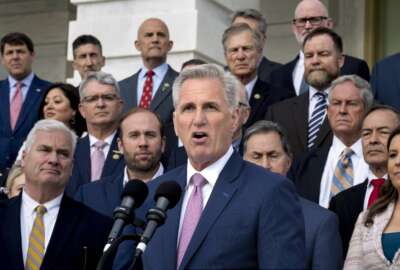
Will theoretical debt-ceiling deadline result in real deal?
In theory there is a debt-ceiling deal between President Joe Biden and House Speaker Kevin McCarthy. But it is not law yet. With days until the theoretical...
In theory there is a debt-ceiling deal between President Joe Biden and House Speaker Kevin McCarthy. But it is not law yet. With days until the theoretical deadline, Congress has a lot of work to do. For the outlook, Federal Drive with Tom Temin spoke with Bloomberg Government Deputy News Director Loren Duggan.
Interview Transcript:
Tom Temin And Loren, what can we expect?
Loren Duggan Well, we’ll see the first test for this bill today as the House Rules Committee meets to prepare it for floor action. And usually this is a perfunctory step, but this is being closely watched because one of the hard things about this is to sell some of the flanks of both sides of the party. And in this case, there’s three very conservative members who they have to sell this bill to and get it through that panel to get it to the floor. So test vote today there. And then tomorrow is supposed to be the key vote in the House where all the members will have a chance to weigh in. Then the tricky part comes because you also have to get this bill through the Senate. And as anyone who has watched the Senate knows, that can take a long time depending on what any one member decides to do. So the big date here, thanks to Janet Yellen’s revision last week, is June five. That’s when she says her ability to manage things is going to become more difficult. So I think we’ll see a lot between now and June five to try to get this thing passed both chambers onto the president’s desk and into law.
Tom Temin Yeah, really interesting. And what do we know about the provisions? I mean, the one thing is there is less money for the IRS than had been envisioned under the infrastructure bill.
Loren Duggan Right. So Democrats in their reconciliation law in 2022, which some people call the Inflation Reduction Act, a name that was kind of questionable at the time, but now there’s $80 billion in that law. Republicans wanted to claw most of it away. The deal that was reached between the White House and House Republicans would claw about 20 billion of that back over the next two years and reallocate it to other things. You won’t see that necessarily in the bill, but it’s part of the trade offs that have been made here under spending. So what the White House has been saying is, yes, we’ll take 10 billion this year or 10 billion next year as we’re doing appropriations. But there’s still going to be a lot of money left if we need to come back and go to Congress in a few years to get more to replenish what’s being taken away, that might be an option. But the idea here is that funding, which would be used for staff and for enforcement and for even, modernization efforts at the IRS, some of that money will be clawed back as part of this deal.
Tom Temin And what else would be clawed back and what else would continue? I mean, how much do we know about the details of what they agreed to?
Loren Duggan We know a good amount. There’s a 99 page bill and then there’s a bunch of documents that both parties have released in the days since the deal was reached. So we know that there are spending caps put in for the next two years, security and non-security caps that will restrain the growth in spending. Some will say it freezes it and limits it to 1% into next year. It also suspends the debt limit through January one, 2025, which means that for the rest of this term of President Joe Biden and this Congress, the debt limit will be taken care of. It’ll be up to the next Congress probably to come in and weigh this again. There are also some changes to the National Environmental Policy Act, not as broad as the permitting reform that some Republicans wanted, but some changes that both sides have said could make a difference. And then there’s some clawing back of COVID funds that were put out there in the last few years not spent. And they’re going to claw those back and use that as savings. So those are some of the big things that are there in addition to like the work requirements on SNAP that were controversial and something where the president is going to have to shore that up with his side of the aisle.
Tom Temin In some ways, then this is a really big test of the party’s leadership because there’s more centralism, for lack of a better word in this, than extreme left or extreme right. None of that. Neither one of them got what they wanted. And so the question is, can it sail at this point?
Loren Duggan That is the big question. And Joe Biden called it a compromise over the weekend and he’s both sides don’t get what they want. I think the Republicans will say they got more out of the president than he ever wanted, given that his starting position was I’m not going to negotiate over raising or suspending the debt limit. So I think there’s a lot of rhetoric that can be used to sell this to the two parties. I don’t think anyone wanted to come out and say that they were too happy because they want to make it seem like it was a fair deal for both sides so that neither side pulls away some of their support. So there’s there’s things in here that both parties will like and things that both parties won’t like.
Tom Temin We’re speaking with Bloomberg Government Deputy News director Loren Duggan. And the House otherwise was not going to be in town this week, correct? But now they will temporarily.
Loren Duggan Yeah, they’re coming in for two days. They’ll do some financial services bills today while they wait for that Rules Committee meeting, get it out onto the floor and then have their vote on Wednesday. Wednesday became the date because of the 72 hour rule. They wanted to have the text available for 72 hours before members were asked to vote on it. So that’s why Wednesday was the day. And then presuming that’s done, the House will go away and leave it to the Senate. This was supposed to be a weekend session for the Senate. They had last week off for their Memorial Day break. So they’re going to do a judge vote tonight and then, I think, start plotting a course on this bill and how soon they can move it.
Tom Temin All right. And then the Senate had other issues it was going to do this week. And will it still get to. Them, do you think?
Loren Duggan Yeah, it’s unclear on the floor, but in the committees, they’re going to fire up again. And there’s some some hearings there. They were going to look at the, I think, a deputy Veterans Affairs secretary, and they’re going to look at other nominations and issues there. So the committees will get up and running. But there’s still a lot before the Senate, particularly on that nomination side. And one of the things we’ll be watching as senators get back into town as what’s next on the Julie Su nomination for the Labor Department because they’re without a full time secretary. That is in some ways preventing them from doing rulemaking. So there there’s there’s questionable Democratic support on that one. And that’s the thing. There’s only 51 Democrats. They can only afford to lose a couple before that nomination is in trouble. And we’ll be looking to see what that support looks like and if that’s one that can move forward.
Tom Temin Yes, because the support for that one is kind of not so widespread. I mean, there’s even some Democrats, I think, that are unhappy or uneasy with Ms. Su.
Loren Duggan Yeah, that’s correct. And I think it’s the questions around, are there enough Democrats or do Democrats have enough concerns that this nomination may not make it all the way? We’ve seen some judicial nominees pull back in recent weeks and withdraw their nomination. So that’ll be a question around this one as well. Will there be enough to get it over the line?
Tom Temin And what about modernizing Homeland Security’s legacy? IT. That’s kind of close to home for our listeners. That’s coming up in the Senate.
Loren Duggan Yep. That’s going to be a committee hearing in the Homeland Security Committee. They often take a look at these things. They they look at more than just Homeland Security, but that is one of the parts of their remit. So we’ll see a hearing this week on that. Might be interesting to see what they’re coming up with there. Often they take bipartisan approaches to things in that committee. So we’ll see if that’s something that can be done. And obviously they’ll be weighing that now with budget pressures as we will have this agreement going forward on what spending might look like for the next couple of years.
Tom Temin Right. If they take away money from the IRS, it’s not going to go to Homeland Security for its modernizing.
Loren Duggan Those are the tradeoffs that you have to make under spending caps. Right.
Tom Temin Pretty much. All right. So the Senate is in town. The House is in town for a couple of days. So everything really now is basically focused on that debt ceiling deal.
Loren Duggan Absolutely. And that will break loose. And I’m sure we’ll talk in coming weeks about spending bills and defense authorization and all the things that this deal could help move forward that had sort of been stalled for the last couple of weeks as they didn’t have this path forward.
Copyright © 2025 Federal News Network. All rights reserved. This website is not intended for users located within the European Economic Area.
Tom Temin is host of the Federal Drive and has been providing insight on federal technology and management issues for more than 30 years.
Follow @tteminWFED





